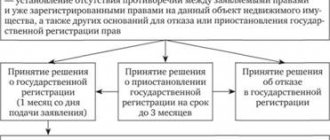The process of transferring ownership of real estate must be recorded in the state register. This gives a certain degree of reliability. If you need to confirm that residential or non-residential property (for example, an apartment, house or even a dormitory) belongs to you, then using other methods to prove your case will be very problematic.
The state registration mark is practically the only document that can confirm the transfer of ownership of real estate to a specific person.
Determination of market and cadastral value of real estate
Thanks to the almighty Internet, without leaving your home, you can independently determine both the cadastral and market value of real estate.
The cadastral value is determined on the website rosreestr.base-n.ru. In the search, just enter the cadastral number or address of the property. In response, you will receive brief characteristics and cadastral value. You can also order a certificate of cadastral value online, the price of which today is 190 rubles.
Determining market value is a little more complicated. To do this, you need to review hundreds of advertisements for sale in the region, compare property characteristics, location and condition.
I would like to note that the cadastral value is significantly lower than the real market value. But market prices can also be unreasonably inflated. What is it for? To the seller – to pay tax on the sale of real estate. For the buyer - to receive a tax deduction. But more on that below.
Required documents
The list of official papers required to formalize the transfer of rights includes :
- the applicant’s passport in the original and copies for submission to the Rosreestr authorities;
- application - signed at a government agency, printed with completed data by an employee of the organization;
- confirmation of payment of the state duty - just provide the bank receipt number;
- an agreement, an act of a state or municipal body, a certificate of inheritance issued by a notary, another basis for the transfer of property;
- acceptance certificate signed by the seller or buyer;
- title documents for property, evidence of rights to dispose of real estate by the seller;
- cadastral passport and technical plan of the BTI with an explanation of the floor plan and the transferred premises into ownership.
Registration of the transfer of ownership of an object acquired under an agreement of shared participation in construction has certain features.
Initially, the developer and the buyer send applications to Rosreestr to register the specified agreement at the stage of construction of the facility. After the house is put into operation by the state commission and the property is transferred by the developer to the shareholder according to the transfer and acceptance certificate of the residential or commercial premises purchased by him in an apartment building. The last stage is the final one, during which the shareholder’s property is registered, information is placed in the state register and an extract from the Unified State Register is issued on establishing the rights of sole ownership.
The shareholder has the right to pay for utilities and move into the premises after signing the transfer and acceptance certificate of a separate property as part of the housing stock; the establishment of ownership affects only the calculation of tax payments - property tax.
Registration of transfer of ownership
Registration of the transfer of ownership with the State Committee for State Registration and Cadastre (Rosreestr).
In order to register the transfer of rights on the basis of a real estate purchase and sale agreement, the seller and the buyer under the agreement contact the State Committee for Registration or the MFC and submit an application in the prescribed form (which can be drawn up by an employee of the State Committee for Register or the MFC).
According to the official website of the Goskomregister, the documents required for state registration of rights when registering a transfer of rights, along with an application, are:
- identification documents of the seller and buyer;
- a document expressing the content of the purchase and sale transaction (agreement) in simple written or notarial form, in the number of copies of at least two, of which one remains in the files of the State Registration Committee after registration;
- a notarized power of attorney to represent the interests of the seller and (or) buyer in the body carrying out state registration of rights, if representatives of these persons apply for registration;
- document confirming payment of state duty in the amount established by the Tax Code of the Russian Federation.
The fees for state registration of property rights arising on the basis of a purchase and sale agreement are currently 1,000 rubles for individuals and 15,000 rubles for legal entities for one piece of real estate.
State registration of rights is carried out within 18 calendar days from the date of receipt of the application and documents necessary for registration.
Supporting documentation for real estate
Once all the necessary checks have been carried out, the new owner is issued a corresponding certificate. It is government confirmation that the registration procedure was successfully completed and all necessary entries were entered into the state register.
A document confirming that the new owner has every right to dispose of the object transferred to him (including official property) - an extract from the Unified State Register of Rights (USR) about the existence of a registered right. This document can be freely ordered from the authority where the registration process took place. However, you need to have grounds, which can be, for example, an agreement with the previous owner on the transfer of residential property, or an act of donation or the right of inheritance. These points are provided for by the tax code.
Taxes and declaration
Paying tax and filling out a declaration to the Federal Tax Service for the sale of real estate. The seller is required to notify the tax authority that he has made a profit from the sale of real estate and pay personal income tax.
- For citizens living in the Russian Federation for more than 183 days a year, such income is taxed at a tax rate of 13%.
- For citizens who received the income in question and were in the Russian Federation for less than 183 days a year, a tax rate of 30% is applied.
If you sold real estate that you owned for less than three years, then you need to independently reflect the income received in your personal income tax return (form 3-NDFL).
Deadlines
Registration of the transfer of ownership is carried out by submitting documents to the Rosreestr authorities directly within 10 days. When contacting an intermediary - the MFC, where you can additionally get advice on the required set of documents, the documentation processing period takes about 14-15 working days. The increase in the period is justified by the need to send papers to the registration authority with preliminary verification by MFC specialists.
It is also possible to send an application with a set of documents online through the State Services website. The terms for consideration of the application remain the same as when applying directly to Rosreestr.
Payment of state fees is also made via the Internet from a card or e-currency wallet, or through Robokassa terminals.
The period for completing documents may increase due to the suspension of the registration procedure for a period of no more than 30 working days due to the lack of certain papers that are required to transfer ownership, or when an application is signed by an unauthorized person, or other legal deficiencies are discovered during the execution of the contract for the transfer of ownership.
Additionally, if the property is not registered as the property of other persons, it is required to carry out the privatization procedure or take possession on the basis of the law on dacha amnesty.
To do this, in relation to residential premises in apartment buildings, you need to contact the executive authority at the location of the property with an application for privatization. The agreement will be prepared within 30 days, after which it must be submitted to the Rosreestr authority to register the transfer of ownership to a private person.
Within the framework of the law on dacha amnesty, in order to obtain ownership of the land, it is necessary to apply to the authority managing the fund with an application for the allocation of a plot of land for a specific intended use. Consideration of the application takes approximately 30 days; based on the result, an act will be issued, with which you can contact Rosreestr in any way to register the transfer of ownership to the new owner.
How to calculate tax
Current legislation gives the seller the right to take advantage of either a tax deduction when selling real estate, or calculate the tax taking into account the costs incurred for its acquisition. When filing a return, the taxpayer himself can determine which option is more profitable for him.
Let's look at two examples:
- Ivanov I.V. sold an apartment in 2020 for 2,000,000 rubles, which he purchased at the beginning of this year for 1,500,000 rubles. The cadastral value of the apartment as of January 1, 2018 was RUB 3,500,000.
The tax deduction is equal to 1,000,000 rubles. Let's calculate the taxable amount of income. 2,500,000 x 0.7=2,450,000 (cadastral value taking into account the reduction factor) is more than the sales price, so it is used when calculating personal income tax. Taxable amount of income = 2,450,000 rubles. We apply the tax calculation formula taking into account the tax deduction: (2,450,000 – 1,000,000) x 13% = 1,450,000 rubles x 13% = 188,500 rubles. Thus, when calculating tax taking into account the tax deduction, it is necessary to pay a tax amount of 188,500 rubles.
- Now let’s calculate the amount of tax taking into account the costs incurred. The conditions are the same. Ivanov I.V. sold an apartment in 2020 for 2,000,000 rubles, which he purchased at the beginning of this year for 1,500,000 rubles. The cadastral value of the apartment as of January 1, 2018 was RUB 3,500,000.
Let's calculate the taxable amount of income. 3,500,000 x 0.7=2,450,000 (cadastral value taking into account the reduction factor) is more than the sales price, so it is used when calculating personal income tax. Taxable amount of income = 2,450,000 rubles. We subtract the amount of expenses incurred (2,450,000 – 1,500,000) x 13% = 950,000 x 13 = 123,500 rubles. Thus, the amount of tax when calculating using method 2 is 123.5 thousand rubles.
Who is exempt from paying tax on the sale of real estate?
As a general rule, if property was owned by a citizen for more than three years (for property acquired from January 1, 2016, this period is increased to five years), then income from its sale is not subject to taxation (Clause 17.1 of Article 217 of the Tax Code of the Russian Federation) .
The minimum three-year ownership period, as today, will apply if at least one of the following conditions is met:
- if the property right was received by inheritance or under a gift agreement from a family member and (or) a close relative of the taxpayer;
- if ownership was obtained as a result of privatization;
- if the right of ownership was received by the rent payer as a result of the transfer of property under a lifelong maintenance agreement with dependents (clause 4 of article 217.1 of the Tax Code of the Russian Federation, clause 11 of article 2 of Law No. 382-FZ).
Close relatives are considered to be relatives in a direct ascending and descending line - spouses, parents and children, grandparents and grandchildren, full and half (having a common father or mother) brothers and sisters (Article 14 of the Family Code of the Russian Federation).
Property tenure
Now let's figure out how to calculate the period of ownership of property. As a general rule, ownership of property arises from the date of state registration and making the corresponding entry in the Unified State Register (Article 219 of the Civil Code of the Russian Federation). It is this date that is the basis (counting date) for calculating the period of ownership of the property (for example, an apartment) when providing a deduction. This means that if, for example, an apartment was purchased on May 15, 2011, then the three-year period of ownership should be considered to have expired on May 15, 2014.
But there are a number of cases when the date of state registration of property rights does not matter:
- When receiving an inheritance, the right of ownership arises from the date of opening of the inheritance (that is, from the date of death of the testator), regardless of the date of its actual acceptance or registration of ownership (clause 4 of Article 1152 of the Civil Code of the Russian Federation).
- When receiving an apartment in a cooperative, the owner enters into his rights from the date of payment of the last share (Clause 4, Article 218 of the Civil Code of the Russian Federation).
- There is also a situation when the apartment was privatized before the Federal Law of July 21, 1997 No. 122-FZ “On state registration of rights to real estate and transactions with it” came into force (it came into force on January 29, 1998), and the certificate of title ownership of it was received later than this day. In this case, the date of receipt of the certificate of state registration of property does not matter - the apartment is considered to belong to the citizen from the moment of privatization (letter of the Ministry of Finance of Russia dated July 18, 2014 No. 03-04-05/35433).
When does ownership of a real estate arise?
Sometimes it is very important to establish the date when ownership of a property arose , for example, when paying income taxes or property taxes. Even one day can affect the period in which a transaction is classified, which can lead to financial consequences. New real estate can become property as a result of inheritance or mortgage purchase, gift or as a result of exchange. We will consider each type separately.
Property purchased
Most often, real estate comes into the possession of a person as a result of its purchase , these are apartments, private houses, land plots, etc. The transfer of ownership of real estate to the new owner is considered to have taken place upon completion of the transaction. The home purchase agreement must undergo state registration; it is after this procedure that the buyer becomes the full owner of the property.
But on the other hand, if the contract and the acceptance certificate for the transfer of housing are signed, the object has already become the property of the buyer, and he has every right to occupy the residential premises he paid for even before the registration of the contract is completed. But legally, ownership becomes finalized only after state registration, the basis for which is properly executed documents.
The extract from the Unified State Register, received upon completion of state registration, indicates the date from which the acquired property is in the ownership of the new owner. From this date, he has the right to dispose of the property - sell it to another person or exchange it for another property, make changes to the design of the property and perform other actions.
A purchase mortgage is a mortgage on a property in exchange for borrowing money - a loan. The borrower's real estate is transferred to the credit institution to secure the repayment of the loan, that is, the lender is transferred the rights to the property, which the borrower continues to use. Mortgage lending is associated not only with housing, but collateral real estate can also be represented by the following objects:
- land plots and other territories;
- residential houses and buildings, apartments and residential premises;
- garages and separate parking lots, country and garden houses;
- buildings and structures for industrial purposes.
large-sized vehicles as collateral - ships and planes, space communications equipment, but this does not apply to the lives of the majority of Russian citizens.
A citizen's property rights allow him to take out a mortgage loan. This also applies to collective property. At the same time, the owners become limited in their rights, since they must coordinate any action in relation to the pledged property with the pledgee. Restrictions are removed after the borrower has fully settled with the credit institution.
Object Inheritance
The degree of legality of property ownership is also established if a citizen receives an inheritance from a deceased relative. Heirs receive rights to the inherited property immediately after the opening of the inheritance case, before state registration. But without registration it is impossible to sell such property.
The legislation provides that in order to complete a transaction, it is first necessary to register real estate in Rosreestr and obtain an extract from the Unified State Register of Real Estate; without this document, it will not be possible to sell the inherited housing. If the inherited object was not entered into the state register before the opening of the inheritance case, then there is a high probability of litigation to confirm the right to property.
The date of commencement of ownership of inherited real estate is considered to be the date of entry into the real estate cadastre . From this date, the heirs receive the legal right to dispose of the property or part of it according to their plans.
Property donated
The donation procedure has its own peculiarity and differs from inheritance in that it is formalized during the lifetime of the previous owner. But this procedure also requires formalization; a verbal agreement is invalid. Although the property passes to the new owner without payment, the agreement must be drawn up in writing and registered in the state real estate cadastre . Later, this will prevent possible claims by other relatives on this property. This is especially true in the case when the donated object is owned not by one person, but by two or more - then everyone’s consent is required.
If there is no agreement, it will not be possible to register ownership of the real estate, and therefore the new owner will not be able to dispose of the gift - neither sell nor exchange.






